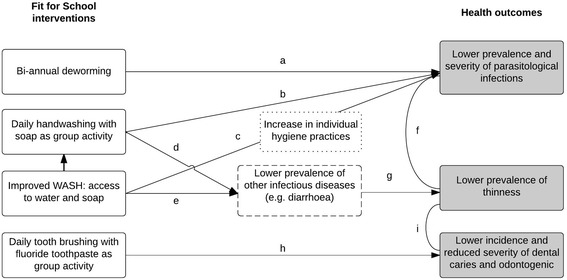Fig. 1.

Hypothesised health outcomes of the Fit for School programme, based on available evidence. Grey boxes represent hypothesised health outcomes resulting from the FIT programme interventions. White boxes with dashed lines represent intermediate health outcomes that were not assessed in this study. White boxes with dotted lines represent intermediate behavioural outcomes that were not assessed in this study. Summary of related evidence: a Biannual deworming reduces the prevalence and severity of intestinal worm infection [28]. b, c, d, e Handwashing with soap and improved access to WASH have been associated with lower prevalence of STH infections [25, 29] and other infectious diseases, such as diarrhoea [10, 30]. f, g Lower prevalence of worm infection and diarrhoea have been associated with weight gain [35, 46]. h Toothbrushing with fluoride toothpaste prevents dental caries and odontogenic infections [31]. i Lower prevalence of dental caries and odontogenic infections are associated with lower prevalence of thinness [38] and weight gain [39]
